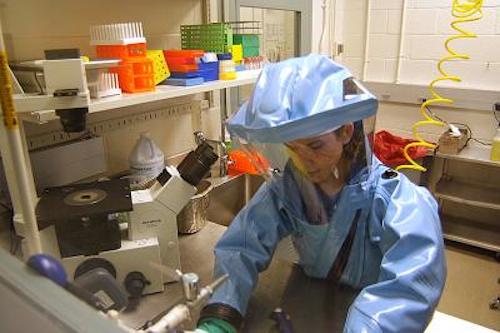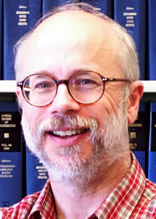
NASHVILLE (BP) — Secular scientists who tell Americans that Ebola is not likely to become airborne are unwittingly basing their conclusion on the lack of evidence for Darwinian evolution, even though many of them are proponents of Darwinism, a leading scientist in the Intelligent Design movement told Baptist Press.
 In addition to providing the only viable explanation of Ebola, a Christian worldview inspires more compassion for Ebola victims than a Darwinist perspective, commentators have noted. Viruses in general also provide evidence that the universe is the product of an intelligent designer rather than blind chance, they say.
In addition to providing the only viable explanation of Ebola, a Christian worldview inspires more compassion for Ebola victims than a Darwinist perspective, commentators have noted. Viruses in general also provide evidence that the universe is the product of an intelligent designer rather than blind chance, they say.
The Ebola virus “is kind of like a tiger pacing in a small cage,” Michael Behe, professor of biochemistry at Lehigh University in Bethlehem, Pa., told BP. “It can go back and forth, fast and slow. The mutations are making it go back and forth rapidly, but it’s not going very far from where it is.”
Ebola’s apparent inability to become airborne “is in line with what we see in other organisms,” said Behe, a senior fellow with the Discovery Institute, a Seattle-based think tank that plays a leading role in the Intelligent Design movement, which argues that the universe is the product of intelligence rather than chance.
 The microevolution (smaller changes within a species) represented by Ebola’s rapid mutation “is easy to see,” Behe said. “But macroevolution, or big changes in organisms” like those necessary to turn Ebola airborne, are “either non-existent — which I think — or extremely rare.”
The microevolution (smaller changes within a species) represented by Ebola’s rapid mutation “is easy to see,” Behe said. “But macroevolution, or big changes in organisms” like those necessary to turn Ebola airborne, are “either non-existent — which I think — or extremely rare.”
Darwinian evolution asserts that humans are the product of macroevolution across millions of years.
Behe is known for pioneering the theory of “irreducible complexity,” which argues that certain biochemical systems cannot carry out their functions unless they are essentially complete, making those systems inexplicable within a Darwinian framework.
The lack of observed macroevolution forms part of the basis for scientists’ assertion that Ebola can only be transmitted through bodily fluids and not through the air, Behe said.
Viruses in general are “utterly mysterious” to advocates of a “Darwinian process” because “there is no good theory at all for how any virus came about,” Behe said, adding that the most reasonable explanation for viruses is an intelligent creator.
Despite Ebola’s deadly character, killing an average of 70-90 percent of those infected, Behe denied that it evidences a malevolent creator. Viruses originally had good purposes, but some have become harmful through genetic alterations over the course of history, he said.
Among their beneficial properties, viruses make some plants drought-resistant or heat-tolerant, protect humans from harmful bacteria and play a role in the development of mammal placentas.
Ebola’s existence doesn’t suggest an evil creator “any more than an automobile shows malevolent intent,” Behe said. “Automobiles can be used and sometimes they cause problems, crashing and killing their drivers or running into people. But the machine itself is good.”
Writers with Answers in Genesis, an organization which teaches that God created the world by His direct action thousands rather than millions of years ago, also argue that Ebola does not provide evidence of Darwinian evolution. The existence of deadly viruses aligns with the Bible’s teaching that mankind’s sin brought ill effects to God’s good creation, they say.
“We know that the original viruses — like the original kinds of bacteria and all other microorganisms — must have been harmless and served useful purposes,” Georgia Purdom, Elizabeth Mitchell and Tommy Mitchell wrote in an article posted on the Answers in Genesis website Oct. 20. “Over the past 6,000 years many disease-causing variations have developed in viruses and indeed in all classes of microbes. However, the more science learns about this hard-to-see part of our world, the more hints we see that these things were designed as a vital part of our world.”
A separate Answers in Genesis article argues that in addition to providing the only viable explanation of viruses, the Christian worldview leads to compassionate care of Ebola patients.
“Ultimately, unlike those with a biblical worldview, secular humanists have no clear moral basis to put themselves at risk to help the downtrodden, sick, and infirm,” Andrew Fabich, a microbiologist at Liberty University, wrote. “If we are just the product of random chance processes over time, as Darwinian evolution asserts, then why not let the sick die off so the strong will survive? However, since we are not the byproducts of random chance processes, we should conduct ourselves altogether differently.”
Fabich urged Christians with medical training to pray about travelling to Ebola-stricken areas to provide care and said all followers of Jesus should pray for the sick.
“Those that contract this deadly virus will most likely meet their Maker soon,” Fabich wrote. “We should pray for the missionaries … on the ground, meeting needs, to give them boldness to share the gospel under such dire consequences. What a wonderful opportunity to share with these sick and dying people that they do not have to spend eternity separated from a loving God.”
In related news, Kerry and Chris Shook of Woodlands Church in Houston are asking churches across America to schedule a “Be the Message Sunday” on which sermons will be shortened to allow time to pack meals for people in countries hardest hit by Ebola. Woodlands, a non-denominational congregation, packed more than 280,000 meals at a pilot Be the Message Sunday in October.
“As we watched the death toll continue to rise in West Africa, we asked ourselves, ‘What can we do to make a difference in the Ebola-affected areas?'” Kerry Shook, pastor of Woodlands Church, said. “Ebola not only affects one’s health, but their entire life. Thousands affected by the virus are unable to work or provide food for themselves or their families. That is why Be the Message Sunday is so important. One of the most immediate ways individuals can help is by supplying much-needed food to those living in West Africa.”
















